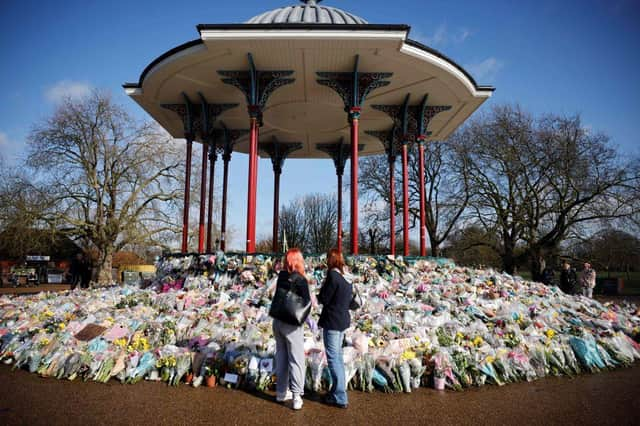Why are we having the same conversation 40 years on?


After the death of Sarah Everad in Clapham, London, and more recently, Julia James, in Snowdown, Kent, women’s safety in public spaces has become something everyone is concerned about.
So-called cat-calling and street harassment has, until recently, been dismissed as unimportant. But not any more. It has been perceived as a part of a much larger issue – women’s safety.
Advertisement
Hide AdAdvertisement
Hide Ad“We could fill every newspaper for the rest of time with crimes against women. It is just a societal problem that really needs to be addressed”, said Jamie Klingler, one of the main organisers of the Reclaim These Streets campaign, which was set up after a planned vigil in memory of Sarah Everard was cancelled. The charity has raised in excess of £537,000 which will be used for supporting Rosa, the only UK charitable funder dedicated to supporting women’s and girls’ organisations.
Often mistaken as compliments, street harassment can often have a long-lasting effect on victims.
Street harassment usually includes unwanted gestures such as wolf-whistling, comments and even physical contact.
Jamie backed the Park Light campaign for better lighting in Sheffield. “I think any time you can shine a light on a space, especially places that might be known for being dodgy that’s got to help.
Advertisement
Hide AdAdvertisement
Hide Ad“By doing that and by pointing at it and making it really obvious it does stop that from being a hotbed of activity”
Dr Michaela Rogers, Senior Lecturer in Social Work at the University of Sheffield tells us her story and how this is a problem that affects many generations.
“My daughter is just fourteen, about a month ago she experienced a young male harassing her in the street. She arrived home from school in floods of tears.
“It brought back memories from my own experience of being harassed in the streets. I was running through a park and I was followed by a man in a van, flashing his lights at me.
Advertisement
Hide AdAdvertisement
Hide Ad“It was pretty scary. This was like in 2000/2002 and then almost twenty years later my daughter is experiencing similar harassment… It makes you angry. Makes you really upset that your child cannot walk home from school without experiencing some form of harassment.”
Recent ONS crime statistics for South Yorkshire show that there has been a rise of 14 per cent in stalking and harassment.
Park Light is a Sheffield-wide campaign that has been launched to petition for increasing lighting in the streets and green spaces.
“Street lighting is important because as someone who has experienced stress harassment in the evening, it does make you feel a little bit safer. You don’t feel so exposed and vulnerable if you are in a bright space,” Professor Rogers said.
Advertisement
Hide AdAdvertisement
Hide Ad“I’m not saying that it might stop something from happening, but if something did happen and someone was passing by, they might spot it.”
She added: “If our neighbours and people in our communities recognise street harassment as the invisible crime that it is and encourage [everyone] to take by-stander intervention… it may be just to go over to the person who is on the receiving end and offer a word of comfort and support and be with them until they are in a safe space. That is something we could all do quite easily.”
FORTY YEARS OF PROTEST
Women’s safety on the street is not a new conversation. But it is still, sadly, relevant.
Back in 1977 Reclaim The Night marches took place in Leeds, York, Bristol, Manchester, Newcastle, Brighton and London.
Advertisement
Hide AdAdvertisement
Hide AdThey were called by the Leeds Revolutionary Feminist Group, who were inspired by news of co-ordinated women-only ‘Take Back The Night’ marches against sexual harassment, held across towns and cities in West Germany.
Inspired by the news from Germany, women in Leeds formed a Reclaim The Night group to take collective action against rape and male sexual violence against women in direct response to the serial murders by Peter Sutcliffe, dubbed the ‘Yorkshire Ripper’, who sexually attacked and murdered thirteen women across the county between 1975 and 1980.
The Leeds Revolutionary Feminist group called for women to march in cities across the UK on the night of November 12, 1977 against rape and for a woman’s right to walk without fear at night.
There is a suggestion that attitudes are beginning to change. Reclaim These Street’s Jamie Klingler, 42, adds: “One of the things that really changed in our march was that this became a discussion between husbands and wives, between dads and daughters. It became okay to say, ‘this happens to me all the time’”
Advertisement
Hide AdAdvertisement
Hide Ad“We do not have the liberty to be mindful in public. We have to worry about ‘Is someone going to touch me in a way that I don’t permit? Is someone going to break my rules of consent?’
“Imagine if all the time that I spent worrying about my own safety and my friends’ safety, if that time could just be spent on being mindful, on looking at my dog and hanging out and sleeping in a park, on having my shoulders down, and actually being relaxed.
Dr Rogers shares the same opinion: “These sorts of campaigns are really important in raising this issue because there is a significant proportion of our population who will not understand what street harassment is. They will not understand the amount of street harassment that goes on every single day. They will not have that kind of knowledge because they have not experienced it.”
To sign the petition for improved lighting in Sheffield go to https://www.change.org/p/sheffield-city-council-ask-sheffield-city-council-for-lighting-in-our-parks